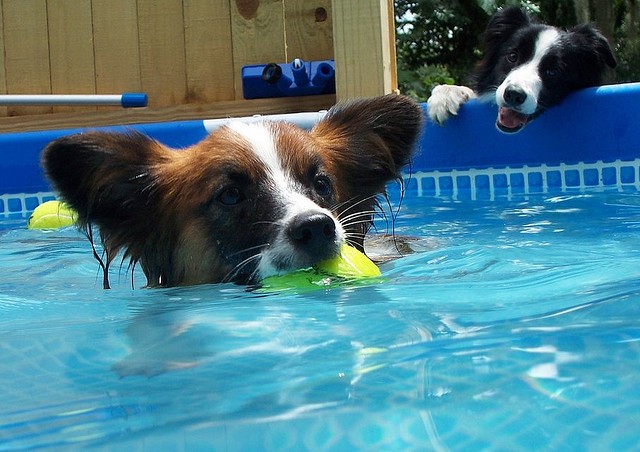|
This guest post comes to you from Vee Cecil. Vee is a wellness coach, personal trainer and bootcamp instructor. Vee is passionate about studying and sharing her findings in wellness through her recently launched blog, which you can read here. It's good stuff people! It only takes a split second for a rambunctious pet to get into trouble. My neighbors and I learned that the hard way last summer when we were spending a day by their pool.
My neighbor was tossing a football in the pool with his son and their boxer was helpfully running after any missed throws. Well, one miss managed to hit a shelf where my neighbor was keeping his pool chemicals and knocked the container of chlorine to the ground. Of course, their dog ran right for the ball, unaware of the danger. Thankfully, we were able to grab him before he got to the spilled chlorine, but it was eye opening for my neighbor. Now, he keeps his pool chemicals locked in an outdoor shed. The dangers associated with pool chemicals often get overlooked, but they can be very dangerous for our four-legged friends. This Q&A addresses some common questions for pet owners: Can chlorinated water harm my pet’s skin or eyes? Like humans, some pets may have sensitive eyes and/or skin. So, yes, even a properly chlorinated pool could cause a pet to have a reaction. An article from EveryDayHealth.com on dogs and water safety provides a great tip. It advises that a good way to gauge how your pet is reacting to chlorinated water is to look at their eyes. If their eyes are red, then they may be having a reaction, and it’s time to get out of the pool. What should I do if I think my pet is exposed to a pool chemical? Despite our best efforts, we can’t always know what our pets are getting into. And even when we take every precaution, they may manage to work their way into an area where chemicals are being kept. And that’s why it’s important that you know as much as possible about the chemicals used in your pool or any nearby pools. As this pool chemical safety checklist explains, all of these chemicals have what is called a Material Safety Data Sheet (MSDS). The MSDS provides the chemical’s flammability and procedures for what to do if someone is exposed to the chemical. And of course, if you think your pet has ingested a chemical or has gotten it on their skin, call your vet immediately! My pet likes to drink from the pool. Should I be worried? In addition to being a fun place to swim, to your pet, a pool might look like a giant water bowl. You can try, but if your pet is spending a lot of time by the pool this summer, you will probably not be able to prevent him or her from taking a few gulps of pool water. As this Q&A from the Houston Chronicle points out, while pool water in small amounts won’t harm your pet, it’s best not to let them make a habit out of drinking the water. Keep a bowl of fresh water in the pool area so that they can get a sip whenever they need it. What should I do if I spill one of the chemicals? Accidents certainly do happen, and if you’re in charge of keeping your pool clean, chances are you might spill one of the chemicals at some point this summer. If a spill does occur, remove your pet from the area until you have it all cleaned up. If the spill is relatively small, the National Capital Poison Center recommends that you hose the area down. For larger spills, refer to the chemical’s MSDS. There’s no reason your pet can’t spend time with you at the pool. But it’s important that all pet owners understand the possible dangers that pool chemicals can pose for their furry friends.
0 Comments
Leave a Reply. |
AuthorI'm just a twenty-something female raising the weirdest dog I've ever met. Archives
January 2019
Categories
All
|


 RSS Feed
RSS Feed
